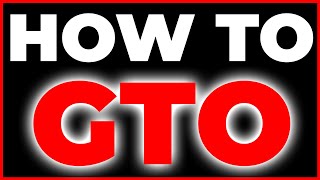Learn Texas Holdem Video Source & Info:
If you play poker, you’ve probably heard of GTO, but what is it exactly? Watch this video to find out.
gtox.io
Source: YouTube

Roulette | Poker | Blackjack | Tips & Strategy
Comments are closed.
All information on this page should be seen as pure entertainment and not pure facts. We disclaims all responsibility for the information from the videos, information and comments.
Always gamble responsibly. You must be at least 18 years old to gamble at the Casinos. Don’t play for more than you can afford to lose.
Visit: https://www.begambleaware.org if you feel that you or someone else have a gambling problem.
Copyright © 2026 Casino Videos
The two pros gpt slaughtered by the kids that never graduated!
The goal of "GTO" as we know it is NOT to maximize chips. When people say GTO they mean replicating the Nash equilibrium strategy, which is not he EV Maximizing strategy (exploitative).
You can't have your cake and eat it too. If you are going to claim GTO is playing the Nash equilibrium and the holy grail of poker, don't turn around and then try and claim it's the same as the chip maximizing strategy, it's NOT!!!
It is mind blowing how much you simplified GTO
I tend to distinguish between 3 approaches to poker strategy:
– "true GTO" or "mathematical GTO" – we would make no assumptions about ranges or sizings and play a Nash equilibrium strategy starting from pre-flop. This is provably unbeatable in a 2-player scenario (although not guaranteed to make money), but funnily enough, it could be -EV in a multi-player scenario, if more than 1 other player is not playing the equilibrium strategy. This approach is being somewhat explored with "pre-flop solves" but generally it's intractable with our current software and computing power.
– "practical GTO" – we take a post-flop heads-up scenario with a bunch of assumptions such as – what the ranges of both players are, what bet sizings they will use, maybe what the rake is. Then, we calculate the best mixed strategy to be taken across the flop, turn, and river and use it as the "baseline strategy" for our decisions & analysis, or just try to religiously play it. "Best" here is interpreted in the game-theoretical sense (it's the Nash equilibrium strategy of this post-flop sub-game that follows our assumptions). This approach is what most players mean when they run solves and say they "study GTO" and/or attempt to play it. Its advantage is that you can come up with a strong, EV-maximizing strategy, while only making a few assumptions about your opponent's play.
– "exploitative play" – we will take any poker spot and make as many assumptions as we can. Those will be at the very be least what our opponent's range is in this spot, but very likely also how they're going to play specific hands in that range (including what sizings they would use in which scenarios), how they will react to our play, and might be as specific as to what exact hand they are holding in a particular situation. Things like live reads can influence our assumptions in this approach. This approach is what most players mean when they say they are "playing exploitative poker". Its advantage is that, if your assumptions are correct, you can generate much more EV than if you avoided those assumptions in the first place aiming for a "practical GTO" strategy.
Neither the "practical GTO" nor the "exploitative play" approach can be formally optimal (in the sense of being a game-theoretical solution to poker) – as both of them make assumptions. And both of them use elements of game theory and probability to decide on strategy. Note that there one could even see a tiny overlap between the two – an exploitative player, given a complete black box of an opponent would have to resort to looking for a "GTO" strategy – as they wouldn't be able to make any assumptions.
Indeed, most players do something in between the two – you will struggle to find "GTO" advocates that never made any additional, "exploitative" assumptions, just like you will struggle to find "exploit" advocates that will try to guess their opponent's exact hand and strategy in every scenario. And indeed, in this video FE didn't actually technically commit to either of the approaches – while the concepts he described are vital for the "practical GTO" approach, they could also be utilized by an "exploitative" player.
A disconnect between the two groups arises because proponents tend to disagree on the set of assumptions they should be making (my intuition, as decribed above, is that "GTO" players try to make as few as possible, while "exploitative" players try to make as many as they can). But I think that even the most diehard "exploitative" player would agree that their strategy doesn't require guessing their opponent's exact holding every hand. And simialrly, I think even the most diehard "GTO" player would agree that if you had an omniscient oracle (a.k.a. Mike Postle) that would "guess" it for you, it would be optimal to use that information to your advantage.
great breakdown. you distilled it down to the main ideas but made it natural to follow
I learned so much and yet spit my coffee into the monitor because of laughing twice 😀
Ofcourse the content was subliminal but 🙂 you did forget the normal fantastic intro music my dear friend ❤
wen ariel chronicles next ep?
Thought I had OK GTO knowledge till I did several hundred GTO simulation hands and my score came down from a 94% high to 58%.
My confidence…
Comment for the algo 😍. Increase your stats – Promo-SM !!